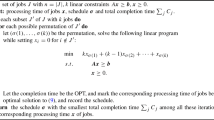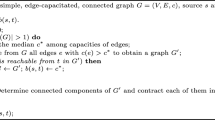Abstract
We consider stochastic variants of the NP-hard 0/1 knapsack problem in which item values are deterministic and item sizes are independent random variables with known, arbitrary distributions. Items are placed in the knapsack sequentially, and the act of placing an item in the knapsack instantiates its size. The goal is to compute a policy for insertion of the items, that maximizes the expected value of the set of items placed in the knapsack. These variants that we study differ only in the formula for computing the value of the final solution obtained by the policy. We consider both nonadaptive policies (that designate a priori a fixed subset or permutation of items to insert) and adaptive policies (that can make dynamic decisions based on the instantiated sizes of the items placed in the knapsack thus far). Our work characterizes the benefit of adaptivity. For this purpose we use a measure called the adaptivity gap: the supremum over instances of the ratio between the expected value obtained by an optimal adaptive policy and the expected value obtained by an optimal non-adaptive policy. We show that while for the variants considered in the literature this quantity is bounded by a constant there are other variants where it is unbounded.

Similar content being viewed by others
Notes
Stirling’s Inequality: For all \(n \in \mathbb {N}_{+}\), \(\sqrt{2 \pi } \cdot n^{n+\frac{1}{2}} \cdot e^{-n} \le n! \le e \cdot n^{n+\frac{1}{2}} \cdot e^{-n}\).
References
Asadpour A, Nazerzadeh H, Saberi A (2008) Stochastic submodular maximization. In: Proceedings of the 4th international workshop on internet and network economics (WINE 2008), pp 477–489
Bhalgat A (2011) A \((2 + \varepsilon )\)-approximation algorithm for the stochastic knapsack problem. Unpublished manuscript. https://pdfs.semanticscholar.org/9ecc/0df2be775950828941c46019534272321918.pdf
Bhalgat A, Goel A, Khanna S (2011) Improved Approximation results for stochastic knapsack problems. In: Proceedings of the 22nd annual ACM-SIAM symposium on discrete algorithms (SODA 2011), pp 1647–1665
Chen K, Ross SM (2014) An adaptive stochastic knapsack problem. Eur J Oper Res 239(3):625–635
DasGupta B, Muthukrishnan S (2013) Stochastic budget optimization in internet advertising. Algorithmica 65(3):634–661
Dean BC (2005) Approximation algorithms for stochastic scheduling problems. Ph.D. dissertation, MIT
Dean BC, Goemans MX, Vondrák J (2005) Adaptivity and approximation for stochastic packing problems. In: Proceedings of the 16th annual ACM-SIAM symposium on discrete algorithms (SODA’2005), pp 395–404
Dean BC, Goemans MX, Vondrák J (2008) Approximating the stochastic knapsack problem: the benefit of adaptivity. Math Oper Res 33(4):945–964
Goemans MX, Vondrák J (2006) Stochastic covering and adaptivity. In: Proceedings of the 7th Latin American symposium on theoretical informatics (LATIN’2006), pp 532–543
Goyal V, Ravi R (2010) A PTAS for the chance-constrained knapsack problem with random item sizes. Oper Res Lett 38(3):161–164
Guha S, Munagala K (2007) Model-driven optimization using adaptive probes. In: Proceedings of the 18th annual ACM-SIAM symposium on discrete algorithms (SODA’2007), pp 308–317
Gupta A, Krishnaswamy R, Molinaro M, Ravi R (2011) Approximation algorithms for correlated knapsacks and non-martingale bandits. In: Proceedings of the 52nd symposium on foundations of computer science (FOCS’2011), pp 827–836
Henig MI (1990) Risk criteria in a stochastic knapsack problem. Oper Res 38(5):820–825
Kellerer H, Pferschy U, Pisinger D (2004) Knapsack problems. Springer, Berlin
Levin A, Vainer A (2013) The benefit of adaptivity in the stochastic knapsack problem with dependence on the state of nature. Discrete Optim 10(2):147–154
Levin A, Vainer A (2014) Adaptivity in the stochastic blackjack knapsack problem. Theor Comput Sci 516:121–126
Li J, Yuan W (2013) Stochastic combinatorial optimization via poisson approximation. In: Proceedings of the 45th annual ACM symposium on theory of computing (STOC 2013), pp 971–980
Ma W (2014) Improvements and generalizations of stochastic knapsack and multi-armed bandit approximation algorithms. In: Proceedings of the 25th annual ACM-SIAM symposium on discrete algorithms (SODA 2014), pp 1154–1163
Martello S, Toth P (1990) Knapsack problems: algorithms and computer implementations. Wiley, Hoboken
Muthukrishnan S, Pál M, Svitkina Z (2010) Stochastic models for budget optimization in search-based advertising. Algorithmica 58(4):1022–1044
Papastavrou JD, Rajagopalan S, Kleywegt AJ (1996) The dynamic and stochastic knapsack problem with deadlines. Manag Sci 42:1706–1718
Acknowledgements
The authors thank Shmuel Onn for suggesting the study of the WT as an interesting variant of SKP.
Author information
Authors and Affiliations
Corresponding author
Rights and permissions
About this article
Cite this article
Levin, A., Vainer, A. Lower bounds on the adaptivity gaps in variants of the stochastic knapsack problem. J Comb Optim 35, 794–813 (2018). https://doi.org/10.1007/s10878-017-0234-x
Published:
Issue Date:
DOI: https://doi.org/10.1007/s10878-017-0234-x




